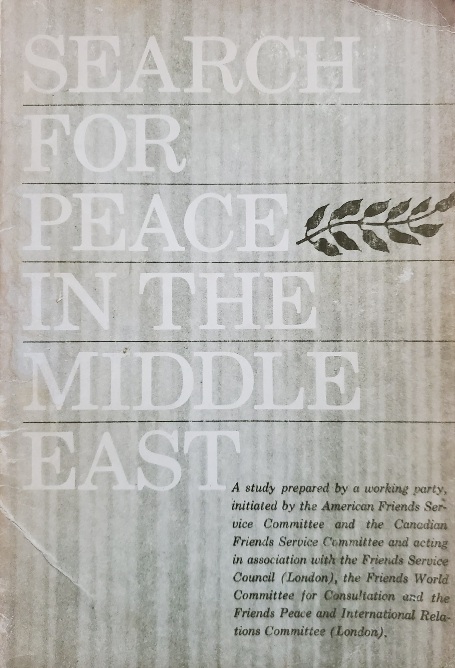
The working party takes two years listening to all parties to the conflict. When it appears Search has a major impact. Hundreds of thousands of copies are sold and it is translated into Hebrew, Arabic, French, and German. The American Jewish Congress and the Anti-Defamation League, in a book-length response, denounce it as “anti-Israel.”
Search breaks new ground, at least in the West, by recognizing the right of the Palestinian Arabs to self-determination and arguing that implementation of this right must be part of any peace agreement. “We do not presume to judge whether [Palestinians’] best interests will be served by the establishment of a new independent Arab Palestine, or by the creation of a semi-autonomous Palestine federated with Jordan, or by reabsorption into the Hashemite Kingdom of Jordan,” the authors write, but they insist that arrangements should be made by the United Nations to determine the will of the Palestinian people.
Search also addresses the Palestinian refugee problem created in 1947-48 and argues, “Within some agreed annual maximum, Israel should agree to receive within its 1967 borders a number of returning refugees, who are willing to live at peace with their Jewish neighbors and who will receive compensatory provision for their re-establishment.” The authors expect that return “will be neither feasible or desired” by most Palestinian refugees and advocate that both they and Jewish refugees from Arab countries should receive compensation for their loses on similar terms
On Jerusalem, the report argues that the city holy to the three monotheistic religions “cannot peacefully become the sole possession of one religion or one national state” and calls for “some sort of federal condominium to govern an undivided and demilitarized Jerusalem.”
The Israeli government of the time is not open to either recognition of Palestinian self-determination nor return of refugees from 1947-48. Also at odds with the Israeli position, Search argues against Israel’s insistence on direct negotiations with the Arab states and its opposition to mediation by the UN and the Big Four (the U.S., Britain, France, and the USSR).
Although Search calls on Arab states and the Palestinians to cease acts of violence and hostile rhetoric, and to declare their acceptance of Israel as a state with the right to live in peace within secure and recognized borders, the report’s departure from Israeli policies is enough to provoke denunciation by American Jewish organizations. As a result, AFSC experiences a significant loss of Jewish financial support that it has received since the 1940’s. Perhaps anticipating the criticism, the authors write in Search, “Our impression, confirmed by many comments from Israelis inside Israel, is that there is a tendency for the leaders of the American Jewish establishment to identify themselves with the more hard-line elements inside the Israeli cabinet…”
Reflecting in 1977 on his experience on the Search working party, Landrum Bolling, shares an insight perhaps critical to any consideration of the Israeli-Palestinian conflict. One of the things that became clear to the working party in their contacts, he writes, “was that many individuals have a tendency to speak in simplistic terms of ‘the Arab position’ and ‘the Israeli position,’ or to say ‘the Arabs’ think so and so and ‘the Israelis’ think so and so. This is all nonsense because there are many Arab positions and many Israeli positions. We found a tremendous amount of misinformation about the nature of the conflict and the points of view of the parties to that conflict.”
More than fifty years after its publication many of the recommendations in Search remain relevant and its vision is still compelling. Looking into a better future in the long term the authors write, “Some kind of confederation relationship of the Arab states of Palestine, Jordan, Lebanon, and Syria with Israel—with ease of trade and travel and an elimination of armed borders among them” might eventually win broad acceptance on all sides.
The members of the Quaker working party that produced Search were Landrum R. Bolling, Editor, President of Earlham College, Richmond, Indiana; William Barton, Associate Secretary, Friends World Committee, London; Colin W. Bell, AFSC Director, Davis House, Washington, D.C.; Alan Horton, Executive Director, American Universities Field Staff, Hanover, New Hampshire; Paul and Jean Johnson, Quaker Representatives in the Middle East, Cyprus; Frances Neely, Friends Committee on National Legislation, Washington, D.C.; Hanna Newcombe, Co-Editor, Peace Research Abstracts and Peace Research Reviews, Canadian Peace Research Institute, Dundas, Ontario; Don Peretz, Director, Southwest Asian and North African Studies Program, Harpur College, Binghamton, New York.